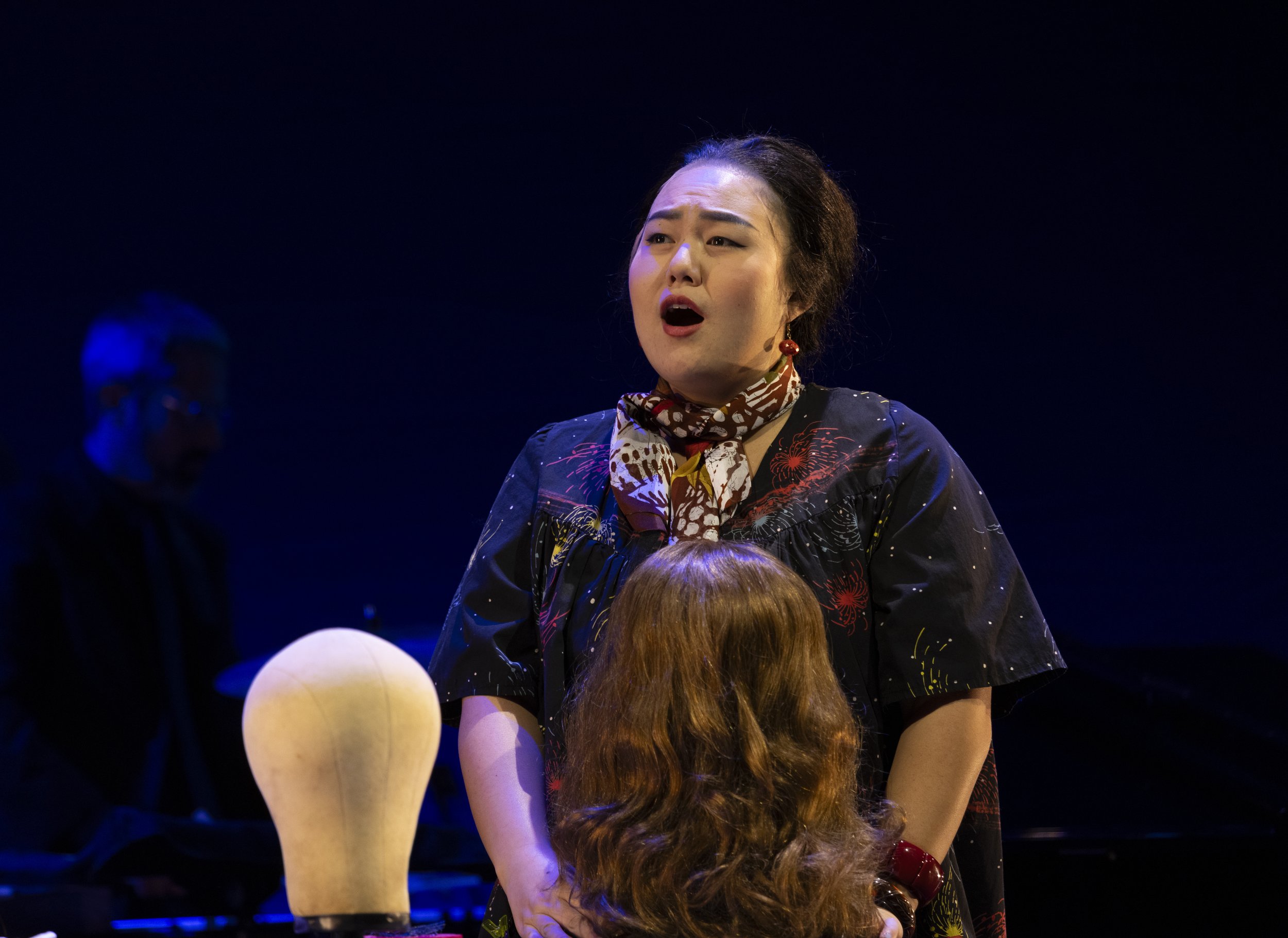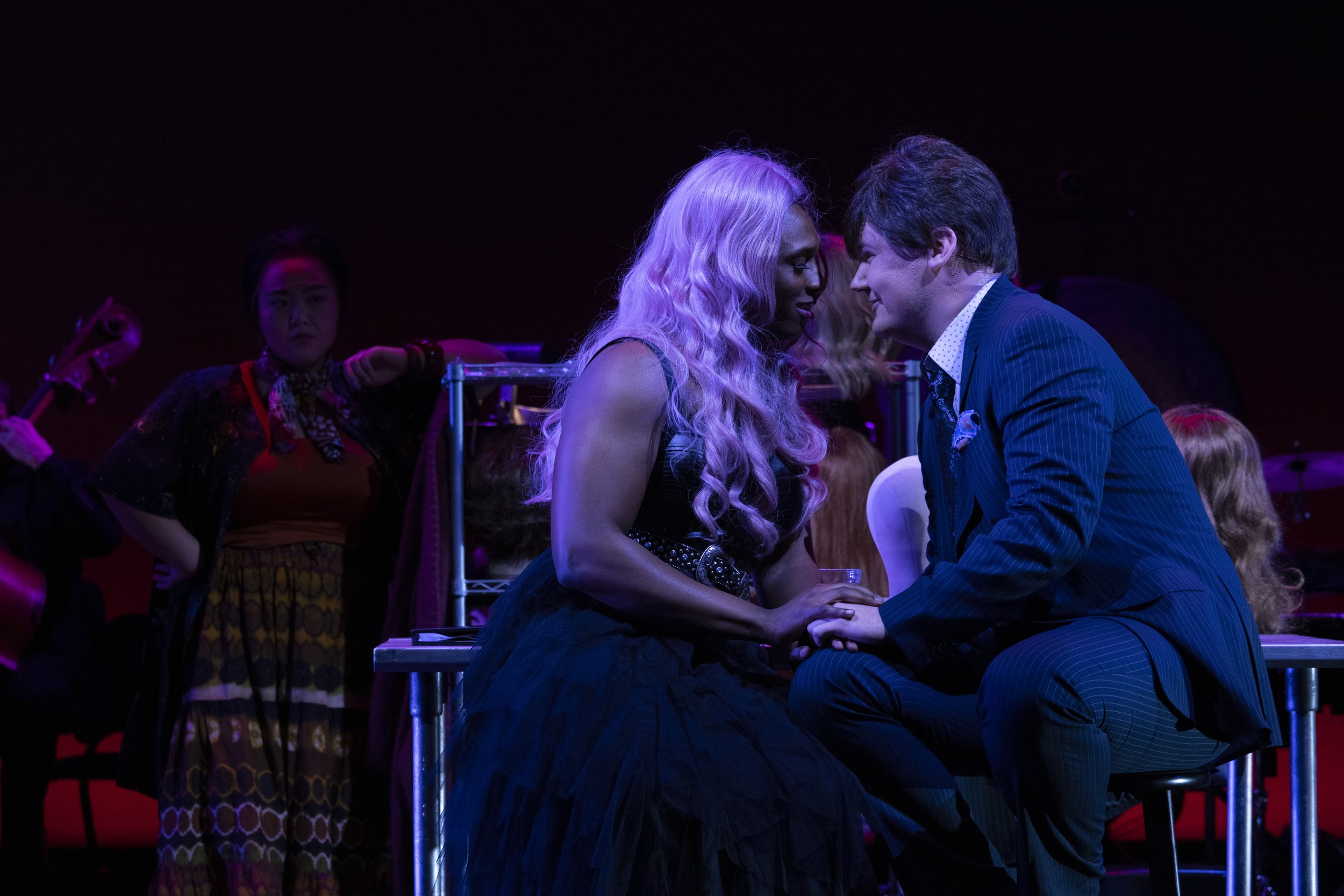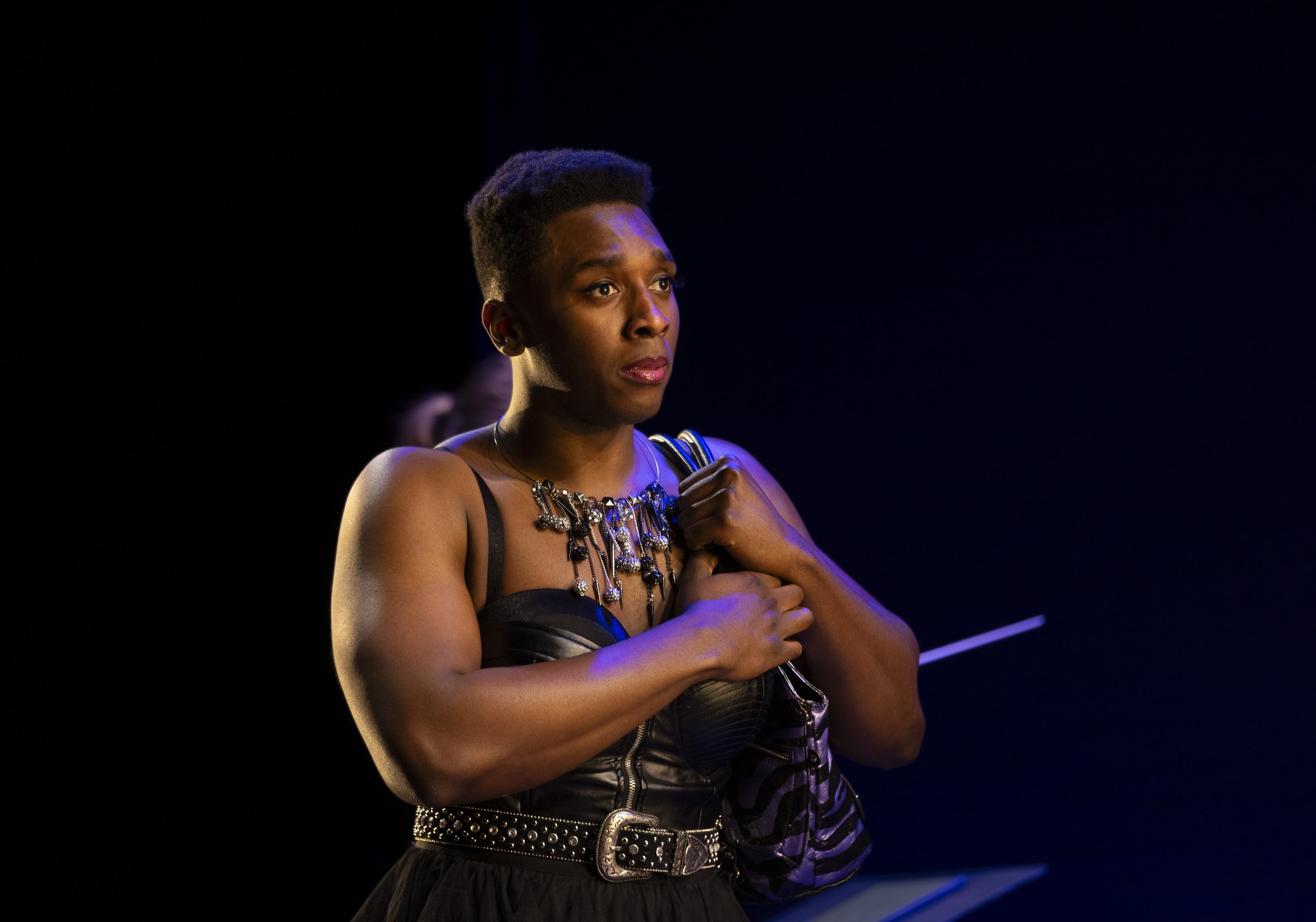Good morning, composer and librettist teams. Your mission, if you choose to accept it, is to come up with 20-minute operas, complete with music, vocals, and storyline to be presented semi-staged, with Cafritz Young Artist singers accompanied by a chamber ensemble of musicians from the Washington National Opera in the Kennedy Center in one year. You will receive mentoring from an established conductor, composer, and librettist, among others, and you will be given access to the resources of WNO. This tape will self-destruct in 5-seconds. Phfft! Smoke appears.
Each year Washington National Opera’s American Opera Initiative selects three composers and three librettists through a highly competitive process, pairs them in teams, and gives them this charge. Their new works are premiered at the Kennedy Center the following January. The results are so engaging and so much fun, one could view this as a party game, but these creative artists are dead serious. It’s what they do, the drama behind the drama.
One year is a short time frame to conceive, construct, and develop to stage ready form for any opera, especially for young creative staff still developing their skills and talents. There is also general agreement that writing a 20-minute opera can be more challenging than writing longer works: the introduction, development, and resolution of a problem must be done in 20 minutes, and keep in mind that it takes longer to sing thoughts than to verbalize them…the music must help to tell the story. The mentors are already established in their fields and the team members already have strong CVs, replete with accomplishments and awards. The composer/librettist teams are to be in attendance and come forward to be recognized with applause at the end of each performance along with the performers. I felt that the volume of artistic talent in the Terrace Theater on Friday night must have caused the sides of the building to bulge.
I find WNO’s American Opera Initiative exciting and look forward each year to seeing what these creative artists will produce. I also greatly look forward to seeing operas with stories I can more readily identify with, that in addition to the universal themes associated with human motives and actions, we encounter familiar landscapes, including TikTok, microplastics, and cell phones. The relevance of these operas to life today never has to be argued. Also, the production of new opera is only one goal of the AOI program. Giving librettists and composers the opportunity to work with mentors and with conductors, musicians, singers, and creative staff provides a boost in developing careers in opera and theater. AOI mentors this year were Conductor David Bloom, Composer Kamala Sankaram, and Librettist Deborah Brevoort. This is a fun and exciting event that typically sells out. One other thing you will see in audiences for AOI performances that you rarely see in the opera houses is lots of young people.
Here are comments on this year’s group of three:
A Way Forward
Composer - Laura Jobin-Acosta
Librettist - José G. Alba Rodríguez
Characters and Cafritz Singers:
Julia – Kresley Figueroa
Helena – Winona Martin
Gabriel – Sergio Martínez
Sergio Martínez as Gabriel, the father, Winona Martin as Helena, the grandmother, and Kresley Figueroa as Julia, the daughter. Photo by Bronwen Sharp; courtesy of the Washington National Opera.
A Way Forward featured a Mexican family that included a grandmother, her son, and his daughter at a time when they are dealing with the fact that the family traditional bakery is failing. Each argues for a remedy based on where they are in time regarding their cultural heritage, and the intensity of their arguing strains the family bonds. The strength of their love for each other leads them to a way they can move forward together. The creative team sees this struggle as especially “poignant for individuals from BIPOC cultures” (I admit I had to look it up – Black, Indigenous, People of Color). The storylines for all three operas were engaging and worthy of exploration. A Way Forward perhaps most needed more time for development. The father was an especially rich character, but we had to learn about him from his words more than his actions. All three singers were excellent in both acting and singing, soprano Kresley Figueroa as the daughter, mezzo-soprano Winona Martin as the grandmother, and bass Sergio Martínez as the father. The music in this work was the most pleasing to me, tightly wed to what was developing in the drama.
Forever
Composer - Elizabeth Gartman
Librettist - Melisa Tien
Characters and Cafritz Singers:
PFAS 1 – Teresa Perrotta
Tardigrade – Cecelia McKinley
PFAS 2 – Sahel Salam
Sahel Salam as PFAS 2, Teresa Perrotta as PFAS 1, and Cecelia McKinley as Tardigrade. Photo by Bronwen Sharp; courtesy of the Washington National Opera.
Forever takes place in a superfund site of a post-apocalyptic world and features two pieces of microplastics (PFAS 1 and 2; PFAS stands for polyfluoroalkyl substances which have the moniker “forever chemicals”) and a Tardigrade (an eight-legged micro-animal). These are lovable characters, but this is not a children’s opera. Apparently these are the last remaining sentient entities on an earth, victimized by environmental pollution and global climate change (why didn’t Mozart and Lorenzo Da Ponte ever think of that). The choice of objects as the characters in a future world without humans was very clever as was the choice to bring up environmental degradation and climate change using absurdist humor. It worked for laughs and for impact and was the most complete work of the three short operas and scored really high on the enjoyable meter. The singers, soprano Teresa Perrotta as PFAS 1, tenor Sahel Salam as PFAS 2, and contralto Cecelia McKinley as Tartigrade were quite charming and effective in singing, and were hoots in their acting. Try to imagine a vampish, polyamorous tartigrade; Ms. McKinley pulled it off (one could imagine Lorenzo Da Ponte thinking of polyamory, but he’d have no concept of a micro-animal). I will point out that the Cafritz singer/actors are young artists, not amateurs. For example, I have already enjoyed Ms. Perrotta’s excellent recent performances in WNO’s Grounded, in Maryland Lyric Opera’s Falstaff, and in Washington Concert Opera’s Nabucco. The adventurous music supported the tragicomedy well. Special Kudos to percussionist John Spirtas who had to make a lot of different sounds with spot on timing. The creative team managed a minor miracle with their approach to such a dark subject. Even when the characters all expired to leave a quiet stage, the need for connections had been affirmed and lived on; hope did not die, at least in the audience.
Hairpiece
Composer – Joy Redmond
Librettist – Sam Norman
Characters and Cafritz Singers:
Ester – Tiffany Chloe
Ari – Jonathan Pierce Rhodes
Gale – Justin Burgess
left photo: Tiffany Choe as Esther. middle photo: Jonathan Pierce Rhodes as Ari and Justin Burgess as Gale; right photo: Jonathan Pierce Rhodes sans wig. Photos by Bronwen Sharp; courtesy of the Washington National Opera.
Hairpiece featured Esther, a wigmaker, Ari, a gender-nonconforming stranger who approaches her to have a wig made, and Gale, a guy the stranger had an encounter with in a bar. All three are dealing with identity issues: Esther is veteran wig maker with failing eyesight near the end of her career, who finds her craft being replaced by machine-made wigs; the stranger is seeking validation, and the guy had just lost a husband the previous year. Composer Redmond and librettist Norman state: “They want the world to see them on their own terms. They want their dignity.” Again, the Cafritz singer/actors delivered strong performances; each created their own identity and made connection with the audience through their singing. In analogy to wig making, the composer/librettist team planned to have different threads of music interweaving to reflect the stories and themes being interwoven on stage. There certainly was a lot going on in the orchestra, but too small a sample to get an overall gauge on it. That said, I enjoyed the music and found it interesting in its coupling with the drama.
The director for the semi-staging of the operas was Chloe Treat who effectively used the few props to assist in telling the stories. The staging of Forever was clever and worked to enhance the comic elements. Costumes by Timm Burrow were well done to support the dramas, with special kudos for Tardigrade’s costume. The orchestra on the small Terrace Theater stage was seated to the left in the back. All three operas were conducted by Maestro David Bloom leading the thirteen piece chamber ensemble from the Washington National Opera Orchestra, and applause to them for their excellent tight knit playing for all three operas.
Long live the American Opera Initiative! There is so much good going on in the AOI program, good for audiences and everyone involved, and for the future of American opera.
The Fan Experience: American Opera Initiative’s Three 20-Minute Operas were performed in two evening showings on Friday, January 19 in the Kennedy Center’s Terrace Theater. Even though written and performed in English, subtitles are shown on two small screens on either side of the stage, which might be challenging viewing near the back of the seating area.
The performances were essentially sold out well ahead of the date. One suspects a significant fraction of the audience is made up of family and friends of the creative staff and performers involved, which makes it more fun, but WNO might consider adding performances, with a matinee on a separate day.
Note: Normally composers and librettists apply individually for the AOI program and are subsequently paired. Preformed teams can apply but both the composer and librettist must be selected individually to remain a team. The review and awards process is managed by AOI Program Director Christopher Cano and AOI Artistic Director Kelley Rourke.
Parking in the Kennedy Center is typically plentiful at around $25 per day, with a small discount for Kennedy Center members when reserved ahead of the day. The Metro to Foggy Bottom and the free red Kennedy Center buses, from there to the Kennedy Center running every 15 minutes, are an excellent option. There is an advantage in getting there a bit early. KC frequently has multiple performances on its different stages overlapping that can create traffic jams.
There are snack stands in the main lobby, and on the Terrace level, the KC Café offers food cafeteria style at moderate prices; fine dining is available on the Terrace level in the Roof Terrace Restaurant. Food and drinks except water are not allowed inside the opera house, but you can purchase reusable capped containers with your drinks that you can take inside.





